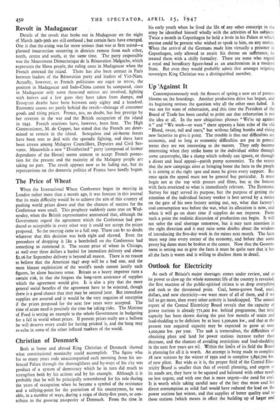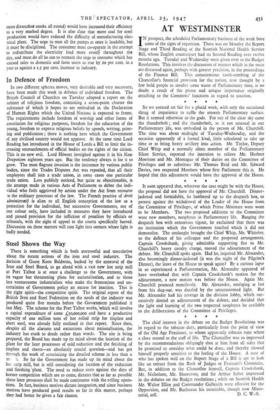Outlook for Electricity
As each of Britain's major shortages comes under review, and as its power to slow up the whole economic life of the country is revealed, the first reaction of the public-spirited citizen is to drop everything and rush to the threatened point. Coal, home-grown food, steel, dollars, and now electricity—we want more of all of them, and if we fail to get more, then every other activity is handicapped. The annual report of the Central Electricity Board reveals that the capacity of power stations is already 771,000 kw. behind programme, that total capacity has been shown during the past few months of strain and load-shedding to be deficient by at least i,5oo,000, kw., and that at the present rate required capacity may be expected to grow at over z,000,000 kw. per year. The task is tremendous, the difficulties of obtaining plant and land for power stations increase rather than decrease, and the chances of avoiding restrictions and load-shedding in the next few years are nil. Within the limits of its field the Board is planning for all it is worth. An attempt is being made to complete 18 new stations by the winter of 1950 and to complete 5,892,700 kw. of new plant. But wide as it is, the proper field of the Central Elec- tricity Board is smaller than that of overall planning, and urgent as its needs are, they have to be squared and balanced with other needs no less urgent, and with one that is more urgent—the need for coal. It is worth while taking careful note of the fact that more coal for direct consumption as solid fuel would have reduced the load on the power stations last winter, and that supplies of better quality coal to those stations (which means in effect the building up of larger and
more diversified stocks all round) would have increased their efficiency to a very marked degree. It is also clear that more coal for steel production would have reduced the difficulty of manufacturing elec- trical plant. The urge to man all the pumps at once is laudable, but it must be disciplined. The consumer must co-operate in the attempt to redistribute the electricity load more evenly throughout the day, and must do all he can to restrain the urge to consume which has caused sales to domestic and farm users to rise by 20 per cent. in a year as against a 1.5 per cent. increase to industry.



































 Previous page
Previous page